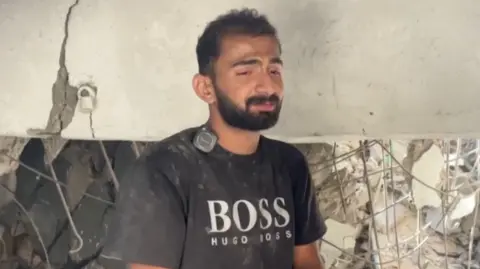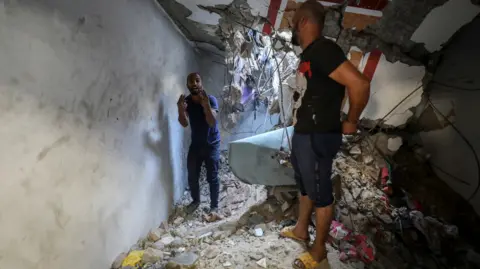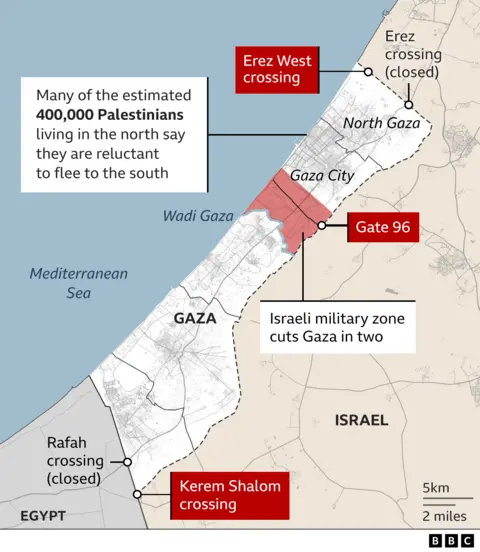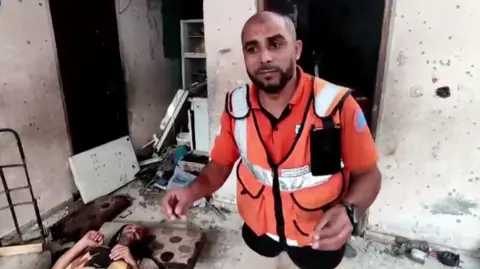Gazans describe fresh horror in north as Israel renews offensive
 Reuters
ReutersWarning: This piece contains graphic descriptions of death and violence
The hand was covered in dust, streaked with blood on the fingers and wrist, all that could be seen of the person who was killed.
Like many other victims of the Israeli air strikes they lie buried under the rubble – this time in Gaza City, in the north.
A teenage boy was pulled from the first floor of a collapsed building. As his feet and legs emerged it looked as if he might be alive.
But then the whole body was lifted free, and flopped lifelessly in the arms of the rescuers.
They leaned across and passed the boy through a window below, and into the waiting arms of another group of men.
In the narrow streets men dug with their hands. But there were no sounds coming from the rubble now. Whoever lay there was beyond help.
 Reuters
ReutersRamez Abu Nasr was digging for hours. His mother, father and brothers were entombed by the falling masonry.
Ramez managed to save his youngest brother. The boy told him that he had heard his parents nearby, reciting the Shehada, the Muslim prayer of faith.
Soon after they were silent.
“I took out my younger brother at the last moment. I don’t know how we can go back to our home… without my mother, or father, or brothers,” says Ramez.
The family fled here from Jabalia when the Israel Defense Forces (IDF) began their renewed offensive against Hamas in the north twelve days ago.
The IDF issued an evacuation order affecting an estimated 400,000 people in the northern Gaza Strip, telling them to move to the south.
But many thousands stayed behind, exhausted by constant displacement, fearful of heading to a place where they had no access to supplies.

Inside a house that is still standing, a young man kneels in front of his dead sister. She looks to be in her thirties. “Oh God, my sister, my sister,” he calls out.
Civil Defence volunteers are gathering bodies from inside buildings. They find a badly wounded man and race to the ambulance.
They are trying to save a life, but also are afraid of being bombed themselves.
Ahmed al Kahlout from the local Civil Defence looked around him at the carnage. Behind him, a colleague tries to give CPR to a woman. It is hopeless.
“This is the al-Sayyed family house,” Ahmed says. “There are bodies, torn parts in this area… It is a horrible crime.”
Several ambulances are lined up in the streets. Most of those inside them are dead. Bodies are piled up. All ages.
Blood seeps from the forehead of a small child. A woman, wrapped in a brightly coloured blanket is loaded beside her. Next to the ambulance a dead man, middle aged, is lying on a hospital trolley.
 Reuters
ReutersMany of the casualties are taken to Jabalia’s Kamal Adwan hospital. It’s director, Dr Hussam Abu Safiyyah, told me by phone that his hospital faced a dire humanitarian crisis and accused Israel of imposing collective punishment.
“We urge the world to intervene and impose their humanity over the Israeli army, to open humanitarian corridors that allow the entrance of medical tools, delegations, fuel, and food so that we can provide humanitarian services for the children, newborn babies, and patients who are in need,” he said.
The United States has accused Israel of refusing or impeding up to 90% of aid to northern Gaza in the last month – and threatened to cut arms shipments unless there is change.
Israel says it is taking American concerns seriously and is “addressing the issue”.
International journalists from media organisations, including the BBC, are not given independent access to Gaza by Israel.
The IDF says it only targets “terror cells” and released a video of what it said was Hamas firing from within a clinic in Jabalia. The army also said they’d found weapons and boobytraps in a medical facility.
In the video an officer, his face blurred, points to booby traps and weapons and speaks to the camera: “Everything here is a cynical exploitation of the civilian population, inside a clinic, inside a civilian compound. We will pursue these terrorists and find them in every corner.”
In Jabalia, a heavily pregnant woman is sitting in the dust outside a house. The Civil Defence workers arrive and help her onto a stretcher. Her father is there and tells her, “You are going to be ok. You are going to give birth, my heart.”
Then a shell explodes nearby. The small group rushes to the ambulance and escapes.
Every day they plead for peace in Jabalia. For food, and medicine, for schools to open.
They plead, but know their voices cannot make it stop.
With additional reporting by Haneen Abdeen and Alice Doyard






